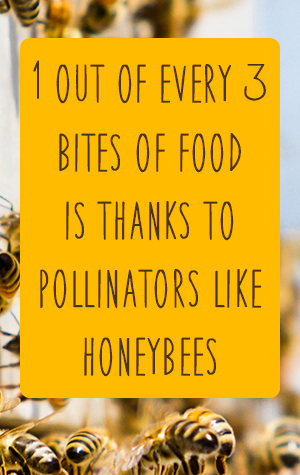Living in a world without honey bees is a scary thought, but a distinct possibility in the future. In parts of China, the wild honey bee is MIA, leaving humans to meticulously pollinate orchards by hand.
Do you know why we need bees?
The honey bee is responsible for pollinating 70 out of the top 100 crops comprising about 90% of the world’s food supply. It’s estimated that 1 out of every 3 bites of food is thanks to pollinators like honeybees. Should the honey bee disappear, so would apples, cucumbers, carrots, almonds, and broccoli. In fact, most fruits, vegetables, and nuts would no longer be around. Coffee, which is struggling the way it is, would also disappear. So would cotton, sunflowers, or other plants where we obtain seed-based oils.
 Without honey bees, the human diet would consist mostly of grains like corn and wheat, because these are the few plants that rely on wind pollination. The lack of honey bees would also effect alfalfa which is grown specifically to create hay to nourish cows. That’s right – even the dairy and beef industries would be severely impacted without honey bees.
Without honey bees, the human diet would consist mostly of grains like corn and wheat, because these are the few plants that rely on wind pollination. The lack of honey bees would also effect alfalfa which is grown specifically to create hay to nourish cows. That’s right – even the dairy and beef industries would be severely impacted without honey bees.
The plight of the honey bee has been been well publicized over the last few years. The tenacious little foragers have had a tough go of it, highlighted by the sudden spike in CCD, or Colony Collapse Disorder, beginning in 2006. CCD occurs when the majority of the worker bees die off suddenly, which essentially kills the entire hive. The actual cause of CCD is unknown, though there are several leading possibilities.
Insecticides, particularly those with nicotine seem to cause acute harm to the bees. A frightening study just released suggests bees prefer plants that have been sprayed with neonicotinoid (nicotine-based) pesticide, even though the chemicals caused them to eat less overall. Certain insecticides have also been shown to affect the honey bee both physically and mentally, causing hive disorientation, and the inability to recognize flowers.
CCD might be caused by other sources as well, such as as stress from traveling. Most honey bees are trucked into orchards for pollination. The traveling process is a stressful one, and it’s possible a hive simply cannot function in such conditions.
Honey bees are of particular importance because not only do they pollinate, but they are the only ones to create honey. In the United States, a heavy reliance on imported honey has come under scrutiny, raising questions about the purity and safety of the product. Other creatures are pollinators as well, and they often need to be catered to. Bumble bees and humming birds are also crucial to pollination, though they may not get the press that the honey bee does.
The good news is there are a few things you can do to help promote honey bee health. 1. Plant a bee-friendly garden. Find out which flowers and vegetables attract honey bees, and plant away! You’ll not only be feeding the bees, but you’ll have a beautiful garden, too.
1. Plant a bee-friendly garden. Find out which flowers and vegetables attract honey bees, and plant away! You’ll not only be feeding the bees, but you’ll have a beautiful garden, too.
2. Build a safe home for the bees. There are a lot of easy DIY bee homes – they can be made from lumber, bamboo, or even hollow sticks.
3. Keep a bee watering hole. Fill a shallow bowl with rocks that can serve as landing pads. Then, fill with water. The bees will be happy to find a safe place to rehydrate!
4. Start your own hive. Easier than it sounds, thanks to the Flow Hive – a recently crowd-funded project that allows you to maintain a honey bee hive and harvest the honey, all without disturbing the bees inside.
5. Avoid chemical pesticides. They do much more harm than good. Try these homemade alternatives instead.
6. Buy organic. Supporting organic farmers goes a long way toward protecting honey bees and entire ecosystems.
The ultimate truth is we need to do what we can now to prevent bees from disappearing entirely. They’re a crucial part of our own ecosystem and without them, we’d simply go hungry — no one wants that, now do they?
Save the bees, please!

